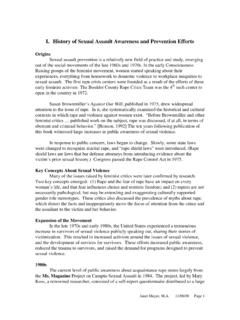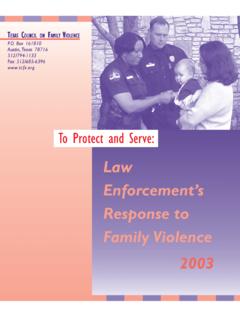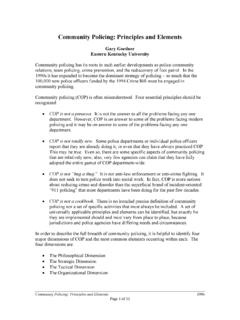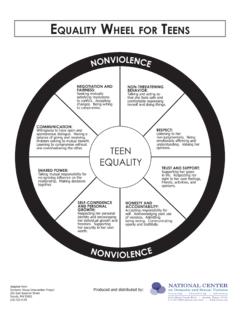Transcription of GETTING THERE SAFELY! TRANSPORTATION ISSUES FOR …
1 GETTING THERE safely ! TRANSPORTATION ISSUES FOR DOMESTIC VIOLENCE PROGRAMS Helping Survivors of Domestic Violence Get Where They Need to Go Prepared by Nancy Flanakin, NCDSV Librarian August 2003 This publication was funded by the Family Violence Program, Texas Department of Human Services. National Center on Domestic and Sexual Violence Page 2 of 7 Helping Survivors of Domestic Violence Get Where They Need to Go August 2003 CONTENTS 1. Helping Domestic Violence Survivors Get Where they Need to Go, by Nancy Flanakin, Librarian, National Center on Domestic and Sexual Violence 2.
2 Sanchez, Thomas W., et al. Transit Mobility, Jobs Access, and Low-Income Labor Participation in Metropolitan Areas. Alexandria, VA: Metropolitan Institute at Virginia Tech, 2003. 3. Charity Cars, Inc. information packet 4. Thompsen, Laurie. The Good News Mountaineer Garage, Breakthrough, [newsletter of the West Virginia Coalition Against Domestic Violence], Fall 2002, pp. 3-4; pages from the Web site of the Good News Mountaineer Garage. 5. Strengthen Our Sisters Cars for Success Web site excerpts 6. Blumenberg, Evelyn and Waller, Margy.
3 The Long Journey to Work: A Federal TRANSPORTATION Policy for Working Families, Center on Urban and Metropolitan Policy, July 2003 This publication was funded by the Family Violence Program, Texas Department of Human Services. National Center on Domestic and Sexual Violence Page 3 of 7 Helping Survivors of Domestic Violence Get Where They Need to Go August 2003 Helping Survivors of Domestic Violence Get Where They Need to Go Prepared by Nancy Flanakin, Librarian, National Center on Domestic and Sexual Violence The goal of this information packet is to help domestic violence service providers and communities expand and improve their TRANSPORTATION assistance to assist women and children to achieve safety and to maintain their independence.
4 The Need for TRANSPORTATION Assistance Lack of TRANSPORTATION is a major problem for victims of domestic violence. In A Blueprint for Domestic Violence Intervention in Texas, the Texas Council on Family Violence lists TRANSPORTATION as a major issue for victims of domestic violence. Evidence is mounting that the only effective TRANSPORTATION for single working parents is the use of a car. Access to a car is a major factor in being able to obtain and sustain employment, a major factor in caring for children, and important in being able to maintain independence and safety.
5 This is certainly true in rural areas, where no or limited public transit services make it impossible to use these services for regular work commutes, especially for parents needing to drop children off at day care, or women trying to gain access to domestic violence service providers or the legal system. Recent research has shown that this problem is the same in metropolitan areas. Even in areas with extensive mass-transit systems, studies have shown that less than half of entry-level jobs are accessible by public transit two-thirds of new jobs are in the A major new study (attached) on the effect of improved access to mass transit on the employment of TANF recipients in six metropolitan areas (including Dallas, Texas)
6 Showed that access to fixed-route transit to employment locations was not positively associated with employment Low-income workers are in fact not less in need of cars than higher-income workers many have children who must be delivered to day care, and many entry-level jobs require evening or weekend hours when buses do not run regularly or are not located on mass transit routes. It is not hard to prove that access to TRANSPORTATION is an important need; in fact, it is critical to helping battered women maintain their independence and safety.
7 However, providing effective 1 Office of Family Assistance. Temporary Assistance for Needy Families Policy Announcement No. TANF-ACT-PA-00-2, May 26, 2000, p. 1. 2 Sanchez, Thomas W., et al. Transit Mobility, Jobs Access, and Low-Income Labor Participation in Metropolitan Areas. Alexandria, VA: Metropolitan Institute at Virginia Tech, 2003. This article is available online at: National Center on Domestic and Sexual Violence Page 4 of 7 Helping Survivors of Domestic Violence Get Where They Need to Go August 2003 TRANSPORTATION assistance requires considerable effort.
8 It is possible at times for people with low incomes to obtain an undependable old car, but it is far too difficult to obtain a car in good condition and still be able to afford car repairs and the requisite registration, inspection and insurance. Many community organizations operate car donation programs to raise money, but effective TRANSPORTATION assistance programs are rare enough to qualify as innovative anti-poverty programs according to the standards of many foundations and federal and local government programs.
9 Both innovative TRANSPORTATION programs and car donation programs just for fundraising are presented in this packet. Types of TRANSPORTATION Assistance Many shelters provide crisis-related TRANSPORTATION services for victims of domestic violence. They use a variety of methods to transport victims to the shelter, to the police station or sheriff s office, to court, to hospitals. They may contract with mass transit agencies for these services or provide cash, tokens, or vouchers for bus or taxi fares. They also may help their clients to obtain and start jobs, making TRANSPORTATION arrangements with job training programs or major employers near transitional housing.
10 This immediate service is invaluable for many women. Some wouldn t be able to get to safety without this type of assistance. While this type of service is critical in the short-term, creating a TRANSPORTATION program that will assist survivors to achieve long-term independence and ongoing safety is essential as well. Charity Cars, Inc. One option for securing cars is Charity Cars, Inc., the first national charitable organization to provide cars through local nonprofit organizations. It is now possible for domestic violence shelters and other community organizations nationwide to affiliate with Charity Cars.

















